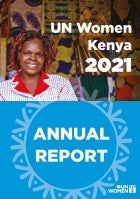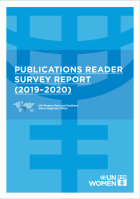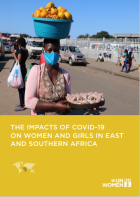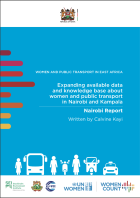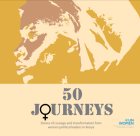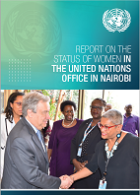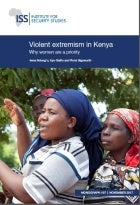21 - 40 of 63 Results
Pagination
Date:
UN Women Kenya Annual report shares results and lessons learned for 2021.
Date:
The survey informs the trends to evidence-based and demand-driven approach for ESARO publications. The survey also informs various publication processes, including the implementation of quality assurance guidance and the centralization of the publication process with stronger accountability mechanisms for knowledge production.
Date:
This study builds on UN Women’s achievements and experience in supporting women and girls during the COVID pandemic within the East and Southern Africa Region and other parts of the world.
Date:
This study is part of a series and was aimed at identifying the general public transport needs of women in Kenya’s capital and identifying the obstacles faced by women in accessing and using public transport. The study also set out to identify interactions between women’s economic activities and public transport use and barriers and identify incidents of gender-based violence (GBV) including harassment of women commuters in Nairobi.
Date:
This analytical study covered ten countries in the region and looked at issues of access to justice for women and girls in East and Southern Africa.
Date:
The purpose of this study was to develop a variety of texts documenting case studies of good and promising practices in the area of the protection of rights and access to services for women with disabilities in East and Southern Africa (ESA) during the COVID-19 pandemic.
Date:
COVID-19 is arguably one of the biggest pandemics to hit the world in recent times. Globally, it has affected the achievement of the Sustainable Development Goals (SDGs) as governments across the world have focused on implementing containment measures.
Date:
UN Women Kenya Annual report aims to share the results and lessons learned for 2020.
Date:
This report explores some key indicators of women’s economic empowerment in labour markets and women’s political participation and economic leadership in the Indian Ocean Rim region through three dimensions: resources, agency, and achievements. It highlights good practices, case studies, and challenges and opportunities for investments and initiatives, and provides key recommendations for Indian Ocean Rim Association (IORA) Member States and other stakeholders to realize women’s economic empowerment in the region.
Date:
This series, updated quarterly, illustrates the human impact of UN Women’s work across the world, highlighting the partnerships that make this work possible. These stories share how we and our many partners are striding forward to realize a better world for women and girls
Date:
This report presents the findings and recommendations of the UN Women commissioned study on Opportunities for Women Entrepreneurs in the Context of the African Continental Free Trade Area (AfCFTA). This study aimed to identify opportunities for women entrepreneurs with regard to the AfCFTA, focusing on three areas of interest: women in informal cross-border trade (WICBT), gender and value chain analysis, and affirmative action/preferential public procurement.
Date:
Women’s struggle for inclusion and equal representation in politics has been difficult and drawn out. But it is an extremely important journey— women’s participation in governance is one of the best ways to tackle gender inequality. Half of the global population is female, and better representation is imperative. In Kenya, representation of women in the 12th Parliament stands at 23.3 percent, the highest since independence…but the lowest in the East Africa region. ...
Date:
The 2017 Status of Women in the UN Duty Station in Nairobi report was commissioned by UN Women’s Regional Office for East and Southern Africa (UN Women ESARO), at the request of the Network of Women Leaders in the UN Nairobi Duty Station to inform efforts to support the realisation of the System-wide Strategy on Gender Parity which was launched by the UN Secretary-General António Guterres on 13 September 2017.
Date:
This study seeks to understand how women in Kenya are involved in violent extremism and in efforts to prevent and counter it. It also explores how women are affected by and respond to extremism. The findings show the multifaceted impact of violent extremism on women and their communities. There is also a complex set of dynamics that influence how women become actively involved as perpetrators or, more commonly, as supporters and facilitators of violent extremism. The study shows that more must...
Date:
This report presents governments’ approaches to the localization and implementation of the Sustainable Development Goals (SDGs) with specific reference to seven countries: Botswana, Ethiopia, Kenya, Malawi, Rwanda, Uganda and Zimbabwe. The report was developed through a collaborative process with selected governments via their representatives, UN Women country/multi-country offices and other stakeholders in East and Southern Africa. Initial data and information were collected from a...
Date:
Renewable, clean energy and gender equality are preconditions for sustainable development and for tackling climate change. This linkage is tacit in the Sustainable Development Goals (SDGs). Gender equality and women’s empowerment (Goal 5) and women’s and men’s equal access to secure energy services (Goal 7) are central to building more environmentally sustainable and climate-resilient societies (Goals 13 and 15) (UN Women and UNDP-UNEP PEI, 2015).
Date:
This is a convening report for the Regional Sharefair on Gender and Resilience in Africa held by UN Women in collaboration with key partners in November 9th –10th 2016 at Safari Park Hotel, Nairobi, Kenya. Focusing on the main theme of “Strengthening Resilience by Empowering Women”, the Sharefair provided a platform for sharing and learning, availed an opportunity to further explore the role of women in building and strengthening resilience and promoted dialogue and sharing of experiences on gender responsive resilience related programmes and policies in Africa. This is expected to accelerate development and humanitarian response and the overall achievement of the Sustainable Development Goals (SDGs). The Sharefair also endeavor to facilitate long term collaboration amongst regional stakeholders with the aim of identifying problems, using data and predictive methods and mobilizing support and resources to incubate, accelerate and scale effective solutions. The outcome of the two-day event was the creation of a strong regional network to amplify resilience solutions, sustaining change in policy and practice within relevant macroeconomic frameworks. Hundreds of participants gathered at the Sharefair to discuss interventions, innovations, good practices, evidence from research and documented data, legal frameworks and policies.
Date:
For some time, women were perceived simply as the victims of violent extremism. Evidence from this study provides a more expansive view, which indicates that women play multiple and complex active roles in relation to violent extremism. These roles exist along a spectrum that extends from being the perpetrators of violent acts through to shaping policy aimed at preventing violent extremism.
Date:
This report is one of three publications on the results of an empirical study on women and violent extremism in Kenya
Date:
In July 2010, the United Nations General Assembly created the United Nations Entity for Gender Equality and the Empowerment of Women (UN Women). In doing so, UN Member States took an historic step in accelerating the Organisation’s goals on gender equality and the empowerment of women.

